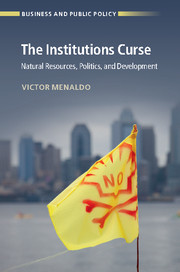Book contents
- Frontmatter
- Dedication
- Contents
- List of figures
- List of maps
- List of tables
- Acknowledgments
- 1 Introduction
- 2 Three puzzles and some building blocks
- 3 Intellectual heritage of the institutions curse view
- 4 The institutions curse theory
- 5 Not manna from heaven after all: the endogeneity of oil
- 6 The resource blessing
- 7 Oil curse or monarchical exceptionalism?
- 8 Conclusions
- References
- Author index
- Subject index
8 - Conclusions
Published online by Cambridge University Press: 05 August 2016
- Frontmatter
- Dedication
- Contents
- List of figures
- List of maps
- List of tables
- Acknowledgments
- 1 Introduction
- 2 Three puzzles and some building blocks
- 3 Intellectual heritage of the institutions curse view
- 4 The institutions curse theory
- 5 Not manna from heaven after all: the endogeneity of oil
- 6 The resource blessing
- 7 Oil curse or monarchical exceptionalism?
- 8 Conclusions
- References
- Author index
- Subject index
Summary
This book was inspired by three big puzzles. Each of them challenges the resource curse, the theory that oil and minerals harm state capacity, democracy, and economic development. The first is that state building and industrialization in the Western world was, to a large extent, ignited by the exploration and production of coal, minerals, and oil. The second puzzle is that, after the 1973 oil shock, new oil producers in the developing world registered big improvements in key political, economic, and social indicators. The third is that hydrocarbon-reliant countries in the Middle East are no worse off today than they were before they discovered oil and are no worse off than their oil-poor neighbors.
Notwithstanding these puzzles, resource reliance is correlated with several pathologies in the developing world. Consider the following data points. Oil-dependent Venezuela is bedeviled by rampant poverty, as well as political and social unrest. Oil-dependent Nigeria is afflicted by environmental degradation, corruption, and political violence. Oil- and gas-dependent Russia is a nasty kleptocracy that increasingly threatens its neighbors, if not world peace. Saudi Arabia, the world's largest oil producer, is ruled as a quasi-theocracy; it is one of the few places on earth where citizens have no say over their political destiny and women live under an Apartheid-like system. Angola, Iran, and Congo, all heavily dependent on natural resources, are poster children for human rights abuses and repression.
What has not been convincingly shown hitherto is if these correlations are causal. Without resorting to an explanation where the causal arrow runs from the former to the latter, this book attempted to make sense of the cross-national association between natural resources and underdevelopment. I explored the idea that, rather than a resource curse, what oil- and mineral-reliant countries suffer from is an institutions curse. Resource reliance is not an unmediated result of oil and minerals that fall like manna from heaven. It is instead endogenous to weak states with low-quality institutions. And it is these institutions that attract capital to natural-resource sectors and incentivize the exploration and production of oil and minerals, as well as its taxation and exportation. Weak state capacity also explains why many developing countries indulge in regressive taxation on inelastic consumer goods and crony capitalism, whether they are resource abundant or not.
- Type
- Chapter
- Information
- The Institutions CurseNatural Resources, Politics, and Development, pp. 349 - 363Publisher: Cambridge University PressPrint publication year: 2016

